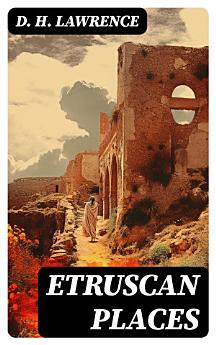Etruscan Places
nov. 2023 · DigiCat
E-book
110
Pages
family_home
Éligible
info
reportLes notes et avis ne sont pas vérifiés. En savoir plus
À propos de cet e-book
In "Etruscan Places," D. H. Lawrence embarks on a profound journey through Italy's ancient Etruscan landscapes, art, and culture, juxtaposing his introspective prose with vivid descriptions that evoke both the physical and spiritual essence of the locations. The text showcases Lawrence's characteristic lyrical style, blending travelogue, philosophy, and a deep appreciation for the natural world, as he reflects on the relationship between humanity and its environment. Written during the early 20th century, against a backdrop of burgeoning modernism and a retreat from industrialization, the book serves as both a personal pilgrimage and a critique of contemporary society's disconnection from its roots. D.H. Lawrence, an English novelist and poet, was deeply influenced by his own life experiences, including his tumultuous relationships and fascination with the primal aspects of human existence. His travels through Europe, particularly in Italy, offered him an escape from the constraints of English society and provided fertile ground for his explorations of art, culture, and identity. Lawrence's deep engagement with the Etruscan civilization reflects his broader quest for authentic experience amid modern malaise. "Etruscan Places" is a compelling exploration for readers invested in the intersections of art, history, and personal identity. As Lawrence captures the essence of the Etruscan spirit, he invites readers to contemplate the enduring connections between past and present, making this book a rewarding read for both admirers of literary travel writing and those seeking to understand the intricacies of cultural legacy.
À propos de l'auteur
David Herbert Lawrence, known as D. H. Lawrence (1885–1930), was an influential English writer recognized for his contributions to literature as a novelist, poet, playwright, essayist, literary critic, and painter. Though often best known for his novels, which include 'Sons and Lovers' (1913), 'Women in Love' (1920), and the controversial 'Lady Chatterley's Lover' (1928), Lawrence's work is notable for its exploration of human consciousness, nature, and sexuality. His writing reflects a deep preoccupation with the dehumanizing effects of modernity and industrialization, advocating for a more profound connection with the primal forces of life. In 'Etruscan Places' (1932), a travel book published posthumously, Lawrence indulges his fascination with ancient civilizations, reflecting on the art, religion, and culture of the Etruscan people. This work demonstrates his versatility as a writer and his enduring quest to understand and articulate the human experience in its most authentic forms. Known for his lyrical prose and the intensity of his emotional and philosophical assertions, Lawrence was also a critical voice in challenging the social norms of his time, which often brought him into conflict with censorship authorities. His literary style is characterized by a unique blend of psychological insight, mythical elements, and a profound sense of place, asserting his legacy as one of the 20th century's foremost literary figures.
Donner une note à cet e-book
Dites-nous ce que vous en pensez.
Informations sur la lecture
Smartphones et tablettes
Installez l'application Google Play Livres pour Android et iPad ou iPhone. Elle se synchronise automatiquement avec votre compte et vous permet de lire des livres en ligne ou hors connexion, où que vous soyez.
Ordinateurs portables et de bureau
Vous pouvez écouter les livres audio achetés sur Google Play à l'aide du navigateur Web de votre ordinateur.
Liseuses et autres appareils
Pour lire sur des appareils e-Ink, comme les liseuses Kobo, vous devez télécharger un fichier et le transférer sur l'appareil en question. Suivez les instructions détaillées du Centre d'aide pour transférer les fichiers sur les liseuses compatibles.







